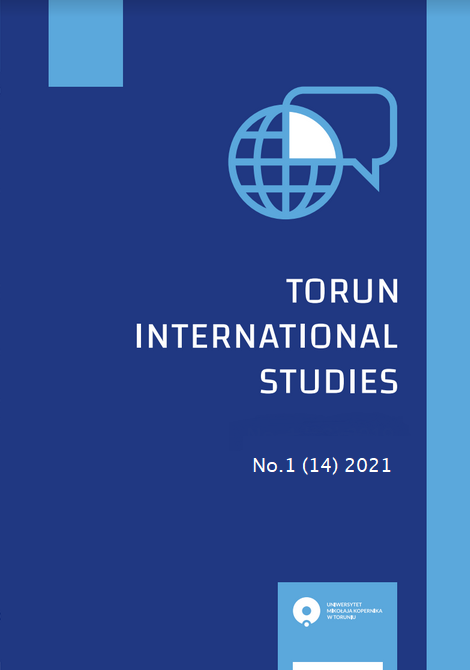RUSSIA BETWEEN CHINA AND UKRAINE: THREE POINTS OF VIEW
DOI:
https://doi.org/10.12775/TIS.2021.003Keywords
neo-realism, Marxism, Russian-Ukrainian war, Sino-Russian relationsAbstract
Russia can be understood in many different ways. Observation from the inside is still possible. Doing your own research is very important, but it can’t be done quickly. The fastest way to understand Russia leads through scientific texts. The level of scientific literature on Russia’s foreign policy can be examined in two ways – through an extensive and long-term analysis of the entire world publications or through a very careful study of the most representative ones. The second path is easier and more effective. Three monographs publishedby the most recognizable scientific publishing houses in the world were analysed: written by experts, scientists using International Relations (IR) paradigms and scholars representing the neo-Marxist approach. Each of the three schools of foreign policy research has significant academic achievements, and also succeeds in the legitimization or de-legitimization of political actors. Each of these schools also has weaknesses. While experts did not always understand the cultural determinants, scientists with a very good theoretical feedback did not always know all historical facts. By contrast, the authors declaring a neo-Marxist approach actually aimed to justify Russia’s policy rather than to understand it. A multi-level understanding of any (including Russian) foreign policy is possible thanks to the critical analysis of scientists work results.
References
Bolt, P. J. (1996). Looking to the Diaspora: The Overseas Chinese and China's Economic Development, 1978-1994. Diaspora: A Journal of Transnational Studies, 5(3), 467-496. https://doi.org/10.1353/dsp.1996.0019
Bolt, P. J. (2014). Sino-Russian relations in a changing world order. Strategic Studies Quarterly, 8(4), 47-69. Retrieved February 10, 2021, from http://www.jstor.org/stable/26270816
Bolt, P.J., & Cross, S.N. (2018). China, Russia and Twenty-First Century Global Geopolitics. Oxford University Press.
Bolt, P. J., Coletta, D. V., & Shackelford, C. G. (Eds.). (2005). American Defense Policy. JHU Press.
Breisach, E. (2007). Historiography: Ancient, medieval, and modern. University of Chicago Press.
Bukkvoll, T. (2016). Why Putin went to war: ideology, interests and decision-making in the Russian use of force in Crimea and Donbas. Contemporary Politics, 22(3), 267-282. https://doi.org/10.1080/13569775.2016.1201310
Cornell, S. E., & Starr, S. F. (Eds.). (2009). The guns of August 2008: Russia's war in Georgia. ME Sharpe.
Cross, S. N. (2006). US/NATO-Russia and Countering Ideological Support for Terrorism: Toward Building a Comprehensive Strategy. Connections, 5(4), 1-25. Retrieved February 10, 2021, from http://www.jstor.org/stable/26323263
Cross, S. N. (2013). Russia and Countering Violent Extremism in the Internet and Social Media: Exploring Prospects for US-Russia Cooperation Beyond the “Reset”. Journal of Strategic Security, 6(4), 1-24. http://dx.doi.org/10.5038/1944-0472.6.4.1
Davies, L. (2016). Russia’s ‘Governance’ Approach: Intervention and the Conflict in the Donbas. Europe-Asia Studies, 68(4), 726-749. http://doi.org/10.1080/09668136.2016.1173652
d'Encausse, H. C. (1987). Big Brother: The Soviet Union and Soviet Europe. Holmes & Meier.
Götz, E. (2015). It's geopolitics, stupid: explaining Russia's Ukraine policy. Global Affairs, 1(1), 3-10. http://doi.org/10.1080/23340460.2015.960184
Götz, E. (2016). Neorealism and Russia’s Ukraine policy, 1991–present. Contemporary Politics, 22(3), 301-323. http://doi.org/10.1080/13569775.2016.1201312
Götz, E. (2017). Putin, the state, and war: The causes of Russia’s near abroad assertion revisited. International Studies Review, 19(2), 228-253. http://doi.org/10.1093/isr/viw009
Götz, E. (Ed.). (2018). Russia, the West, and the Ukraine Crisis. Routledge.
Götz, E., & Merlen, C. R. (2019). Russia and the question of world order. European Politics and Society, 20(2), 133-153. http://doi.org/10.1080/23745118.2018.1545181
Grant, T. D. (2015). Annexation of Crimea. American Journal of International Law, 109(1), 68-95. http://doi.org/10.5305/amerjintelaw.109.1.0068
Grimsted, P. K. (2020). Czartoryski's System for Russian Foreign Policy, 1803: A Memorandum, Edited with Introduction and Analysis. University of California Press, pp. 19-92.
Kaczmarski, M. (2015). Russia-China relations in the post-crisis international order. Routledge.
Kagarlitsky, B. (2000). The Twilight of Globalization: Property, State and Capitalism. Pluto Press (UK).
Kagarlitsky, B. (2002). Russia under Yeltsin and Putin: Neo-liberal autocracy. Pluto Press.
Kagarlitsky, B. (2008). Empire of the Periphery: Russia and the World System. Pluto Press.
Kagarlitsky, B. (2014). From empires to imperialism: the state and the rise of bourgeois civilisation. Routledge.
Kagarlitsky, B. (2016). Ukraine and Russia: Two states, one crisis. International Critical Thought, 6(4), 513-533. http://doi.org/10.1080/21598282.2016.1242087
Kagarlitsky, B. (2017). Brexit and the future of the left. Globalizations, 14(1), 110-117. https://doi.org/10.1080/14747731.2016.1228800
Kagarlitsky, B., Desai, R. & Freeman, A. (Eds.). (2018). Russia, Ukraine and Contemporary Imperialism. Routledge.
Klymenko, L. (2020). Understanding the Donbas War in Terms of World War II: A Metaphor Analysis of the Armed Conflict in Eastern Ukraine. Ethnopolitics, 19(5), 483-500. http://doi.org/10.1080/17449057.2019.1608064
Lukin, A. (2018). China and Russia: The new rapprochement. John Wiley & Sons.
Maréchal, N. (2017). Networked authoritarianism and the geopolitics of information: Understanding Russian Internet policy. Media and Communication, 5(1), 29-41.
Mearsheimer, J. J. (2014). Why the Ukraine Crisis Is the West’s Fault. Foreign Affairs, 93(5), 1–12.
Mikhelidze, N. (2009). After the 2008 Russia-Georgia War: Implications for the Wider Caucasus and Prospects for Western Involvement in Conflict Resolution. Instituto Affari Internazionali.
Nairn T., & James, P. (2005). Global Matrix: Nationalism, Globalism and State Terrorism. Ann Arbor, MI, Pluto Press.
Parkhitko, N.P., & Martynenko, E.V. (2018). Global Political Aspects of Putin’s Speech at the 43-th Munich Security Conference. One Decade Past. RUDN Journal of Political Science, 20(1), 7-20. http://doi.org/10.22363/2313-1438-2018-20-1-7-20
Robinson, P. (2016). Russia's role in the war in Donbass, and the threat to European security. European Politics and Society, 17(4), 506-521. http://doi.org/10.1080/23745118.2016.1154229
Snyder, T. (2014). Fascism, Russia, and Ukraine. The New York Review of Books, 20(03), 2014, 1-6.
Szporluk, R. (2020). Russia, Ukraine, and the breakup of the Soviet Union. Hoover Press.
Wilson, A. (2014). Ukraine crisis: What it means for the West. Yale University Press.
Downloads
Published
How to Cite
Issue
Section
Stats
Number of views and downloads: 812
Number of citations: 0



